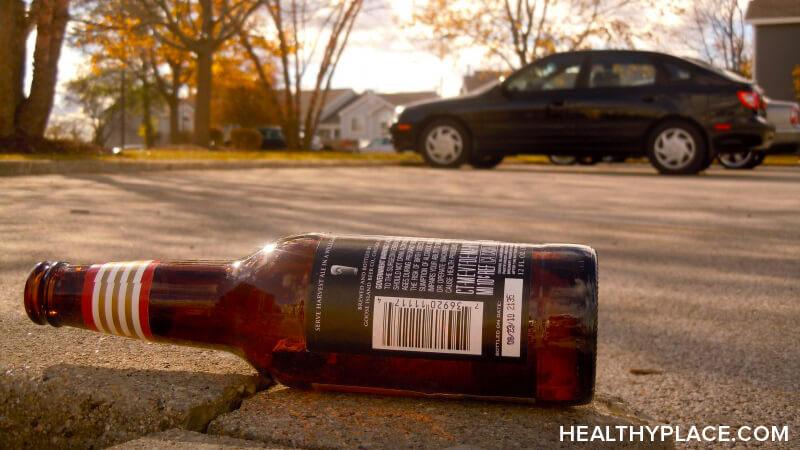Are You Powerless Over Your Addiction? Here's How to Know

Recognizing powerlessness over addiction is the first step to freedom--both literally and in literature. It's recognizing your powerlessness that is the tricky part. So here are some ways to know if you are powerless over your addiction.
Powerless Over Your Addiction? No One Knows But You
Any substance or activity can be considered an addiction--from drinking to video games, addictions alter your life. If your addiction altered your life, then it has the power--you are powerless over your addiction. Your answers to the following questions will help you decide if you're powerless over your addiction.
Are You Using the Addiction to Block Out Reality?
The first question you should ask yourself is, "Am I using this addiction to block out reality?"
I frequently remarked when life got tough, "This is why I drink."
That's a warning sign that you may have a problem--if you can't deal with life without the addiction in question. If you must have the addiction to feel normal, beware, you may be powerless over your addiction.
Do You Rationalize Self-Medication?
There's a big difference between prescribed medication and self-medicating. For starters, antidepressants don't turn into formaldehyde in your liver like alcohol does, according to my psychiatrist. Another thing--antidepressants don't work on people who don't have a mental illness, whereas alcohol affects everybody. A third difference--you can usually predict how a medication will affect you after taking it for a while. There is very little variation on a successful medication regimen., but when it comes to alcohol, you never know how you'll react if you're using it to self-medicate. In my active addiction, alcohol frequently caused more problems than it helped me forget.
Some other differences--taking your medication typically keeps you out of the hospital. I've seen alcohol put people in emergency rooms (police here in Indianapolis typically take drunks to the hospital to sober up since under the law you can't be arrested for public intoxication unless you're dangerous to yourself or others). Drunk people also end up in psychiatric wards and jails. Taking a medication is designed to prevent self-endangerment, while there are no guarantees with an abused substance.
Do You Justify Your Addiction?
Denial is a classic symptom of addiction, especially in the form of justification. In other words, "You'd drink too if you had my life" is a warning sign of powerlessness over addiction. So is, "How is taking a drink to calm down different from taking medication to calm down?" If you have to justify your use of the substance, you may have a problem.
I used to argue--especially when hospitalized--that taking a drink to calm down was no different than taking pills to calm down, much to the staff's annoyance (Alcoholism and Mental Illness). "Alcohol has been around since before the time of Christ," I'd argue. "We know what the side effects are. We don't know what these medications do."
The problem is alcohol can kill you quickly in the event of an overdose or slowly in the form of liver disease. Medications are closely monitored to make sure they're not causing potentially lethal problems.
If you justify your use of your addiction, you may be powerless over it.
Has Your Addiction Put You in the Hospital?
Or cost you your job? Caused you to neglect your children? Got you in trouble with the law? Cost more money than you have to spend?
Going to the hospital was what finally got my attention--I ended up in the dual diagnosis unit of a state hospital in Richmond, Indiana. Hopefully, you recognize if you are powerless over your addiction before it hits this point--but in my case, it took this, and even then my recognizing powerlessness over alcohol came and went. If your substance use has ever put you in the hospital, you have a problem.
Sometimes substance use puts you in the hospital by causing legal problems and the cops take you there for a blood draw or to dry out. Sometimes substance use puts you in the hospital by causing physical problems such as alcohol poisoning or liver damage. And sometimes it puts you in the hospital by causing mental problems such as suicidal ideation. But if it puts you in the hospital, you have a problem--normal people don't drink themselves into the hospital.
If You Are Powerless Over Your Addiction
But the good news is there is hope. Recognizing powerlessness over an addiction is the first step to freedom. When you recognize you are out of control, you can regain control. You can't quit if you don't believe you have a problem. But by believing you have a problem, you can begin to overcome it.
APA Reference
Oberg, B.
(2017, June 19). Are You Powerless Over Your Addiction? Here's How to Know, HealthyPlace. Retrieved
on 2026, March 4 from https://www.healthyplace.com/blogs/recoveringfrommentalillness/2017/06/recognizing-powerlessness-over-a-substance-is-the-first-step-to-freedom